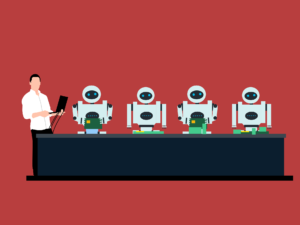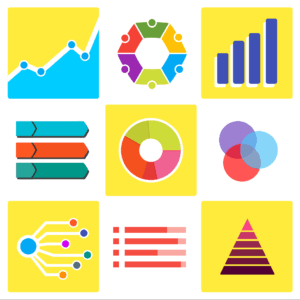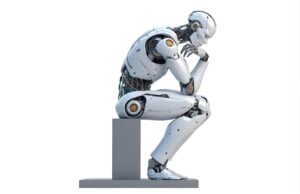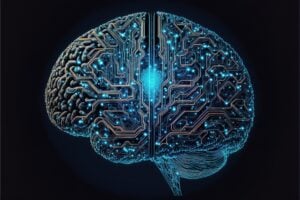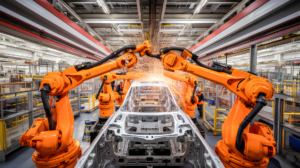Riding the AI Evolutionary Wave
For the insights community, AI is bringing about more automated data analysis, faster insights generation and streamlined reporting, among other advantages. This in part could lead to a democratization of insights, as presumably insights will be easier to acquire, access and understand—creating more opportunities for stakeholders, other teams such as marketing and other organizations to access those insights. This could lead to more actionable insights, creating real-time decision-making capabilities.
What other disruptive changes could take place with the rise of and developments in AI? IBM explored the subject in its blog, “The future of AI: trends shaping the next 10 years.” As it looked ahead, IBM noted several trends including the move from generative AI to multimodal AI.
Already, gen AI is changing and as models go through their development and become smarter and more versatile, they will better understand humans and their needs; and for specific tailored industries as well, including insights. “As LLMs are trained on more specific information, they can provide deep expertise for specialized industries, becoming always-on agents ready to help complete tasks,” observes IBM.
IBM further notes, “Between now and 2034, AI will become a fixture in many aspects of our personal and business lives. Generative AI models such as GPT-4 have shown immense promise in the short time they’ve been available for public consumption, but their limitations have also become well known. As a result, the future of AI is being defined by a shift toward both open-source large-scale models for experimentation and the development of smaller, more efficient models to spur ease of use and facilitate a lower cost.”
Other trends as noted by IBM include:
- Multimodal: The fledgling field of multimodal AI will be thoroughly tested and refined by 2034. Unimodal AI focuses on a single data type, such as NLP or computer vision. In contrast, multimodal AI more closely resembles how humans communicate by understanding data across visuals, voice, facial expressions and vocal inflections. This technology will integrate text, voice, images, videos and other data to create more intuitive interactions between humans and computer systems.
- Democratization of AI and easier model creation: AI will become even more integrated into personal and professional spheres, driven by user-friendly platforms that allow nonexperts to use AI for business, individual tasks, research and creative projects. These platforms will enable entrepreneurs, educators and small businesses to develop custom AI solutions without requiring deep technical expertise.
- Hallucination insurance: As generative AI becomes more centralized within organizations, companies might start to offer “AI hallucination insurance.” Despite extensive training, AI models can deliver incorrect or misleading results. These errors often stem from insufficient training data, incorrect assumptions or biases in the training data.
- AI in the c-suite: AI decision-making and prediction modeling will advance to the point where AI systems function as strategic business partners, helping executives make informed decisions and automate complex tasks. These AI systems will integrate real-time data analysis, contextual awareness and personalized insights to offer tailored recommendations, such as financial planning and customer outreach, that align with business goals.
- Agentic AI: AI that proactively anticipates needs and makes decisions autonomously will likely become a core part of personal and business life. Agentic AI refers to systems composed of specialized agents that operate independently, each handling specific tasks. These agents interact with data, systems and people to complete multistep workflows, enabling businesses to automate complex processes such as customer support or network diagnostics.
- Data usage: As human-generated data becomes scarce, enterprises are already pivoting to synthetic data—artificial datasets that mimic real-world patterns without the same resource limitations or ethical concerns. This approach will become the standard for training AI, enhancing model accuracy while promoting data diversity. AI training data will include satellite imagery, biometric data, audio logs and IoT sensor data.
AI’s Transformative Impact
During TMRE 2025, the session, “How AI Will Radically Transform the Insights Industry” will be presented by Christina Habib, Chief Insights Officer, Beauty & Wellbeing at Unilever, and Stan Sthanunathan, CEO at i-Genie.AI Inc.
AI is poised to transform the insights industry by revolutionizing how data is collected, analyzed, and translated into actionable business intelligence. AI technologies—particularly machine learning, natural language processing, and predictive analytics—will dramatically accelerate the speed and scale of data processing while uncovering deeper patterns and correlations that human analysts might miss.
This transformation will likely reshape roles within the industry, with professionals shifting from data gathering to higher-value interpretation and strategic consulting. Organizations will benefit from more personalized, real-time insights delivered through intuitive interfaces, enabling faster decision-making across all business functions. However, this evolution also brings challenges around data privacy, algorithmic bias, and the need for human oversight to ensure ethical implementation and contextual understanding.
The Future is Now
What’s interesting about IBM’s vision of AI developments into 2034, is just how many of the trends they selected as growth drivers are already coming to fruition today. We have not even touched on the changes coming in regulations and ethics, as corporations grow under new AI systems.
As AI capabilities continue to advance, the insights industry will increasingly focus on delivering not just what happened, but why it happened and what will likely happen next—creating a new paradigm of predictive and prescriptive intelligence that drives business value.
Video: “The State of AI in Market Research and Insights in 2025,” courtesy of NewMR Videos.
Contributor
-

Matthew Kramer is the Digital Editor for All Things Insights & All Things Innovation. He has over 20 years of experience working in publishing and media companies, on a variety of business-to-business publications, websites and trade shows.
View all posts
















